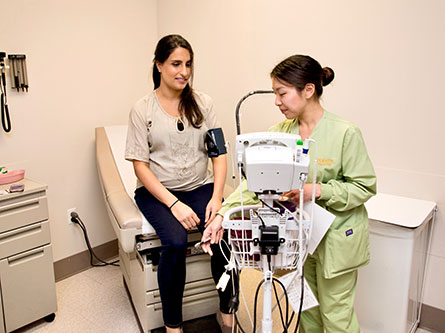Preeclampsia is a serious complication during pregnancy. It can cause high blood pressure and can affect other organs – most commonly the kidneys. Preeclampsia can happen anytime after 20 weeks of pregnancy, and up to weeks after delivery of the baby.
Why does preeclampsia happen? What are the causes of preeclampsia?
There's no known cause of preeclampsia. Health experts believe it could be due to a problem with how the placenta develops from the time it implants in the uterus.
Learn more about complications during pregnancy
What are preeclampsia symptoms?
Common symptoms of preeclampsia include:
- Swelling in your face, hands and ankles
- Headaches
- Vision changes
More serious symptoms of preeclampsia include:
- Severe headache (some of the worst headaches you've ever had)
- Shortness of breath
- Upper abdominal pain
- Nausea and vomiting
- Seizures (eclampsia)
Find out more about preeclampsia symptoms
What are the first signs of preeclampsia?
Some women may not know they have preeclampsia until they go to their health care provider and have their blood pressure checked. That's usually when it's first detected. A urine sample can also detect preeclampsia if there are high levels of protein in the urine.
The most common symptoms women may experience that signal preeclampsia include swelling, headaches and vision changes.
Sign up for our Health Highlights e-newsletter
What are the risks of preeclampsia?
There are some factors that can increase your risk of preeclampsia. These include:
- Having preeclampsia in the past
- Being pregnant with twins, triplets or more children
- Having certain conditions, such as high blood pressure, kidney disease, diabetes or certain autoimmune diseases, like lupus
- First-time pregnancy
- Being obese
- Women ages 35 and older
Explore our care for high-risk pregnancies
Can you recover from preeclampsia?
Yes. Once your baby is born, your preeclampsia symptoms will likely go away in days to weeks. However, some women experience postpartum preeclampsia for longer. Work with your health care provider to monitor your symptoms after delivery.
Check out how we provide a safe, memorable childbirth experience
How do you prevent preeclampsia?
Preeclampsia can't be totally prevented, but there are things you can do to reduce your risk.
- Take baby aspirin every day. This may reduce your risk of preeclampsia by 15%.
- Work with your health care provider to manage conditions, such as diabetes and high blood pressure.
- Lose weight before you plan to conceive.
What are some treatments for preeclampsia?
Treatments for preeclampsia depends on how far along in pregnancy you are and how serious preeclampsia is for you.
Delivering your baby is the main way to resolve preeclampsia, since it's a condition only during pregnancy or directly afterwards. If the baby isn't mature enough for delivery, your health care provider may prescribe medications.
The medications that may help treat preeclampsia include antihypertensive drugs to lower blood pressure or magnesium sulfate to prevent seizures. Your provider will work closely with you to monitor your condition until your baby is born.
See how we provide advanced care for your pregnancy
What happens if you are diagnosed with preeclampsia?
Your health care provider will check your blood pressure. If it's 140/90 mmHg or higher, your provider will likely order more tests to confirm preeclampsia diagnosis. These tests can include urine analysis, blood test, fetal ultrasound and a nonstress test to check your baby's heart rate.
Once you are diagnosed with preeclampsia, your health care provider will determine whether medications are necessary or if your baby is mature enough to be delivered.
How does preeclampsia affect your baby?
Preeclampsia can be associated with decreased blood flow to your developing baby and can affect their growth. This is called intrauterine growth restriction, or IUGR.
Also, if you have worsening symptoms, increased blood pressure, and/or worsening lab abnormalities, then you may need to deliver prematurely to help you get better.
This blog was medically reviewed by OB-GYN Clara Paik.




